Explore the resilience and faith of biblical mothers, uncovering timeless lessons on love and sacrifice that still resonate today.

Examples of Mothers in the Bible
Like a tapestry woven with threads of resilience, love, and faith, the stories of mothers in the Bible offer you a rich narrative of female strength and divine purpose.
You'll find Sarah, who became a mother of nations against all odds, and Jochebed, whose clever defiance saved her son and altered the course of history.
But their stories, along with those of Rebekah, Hannah, Elizabeth, and Mary, are more than ancient texts. They pose intriguing questions about faith, sacrifice, and the power of maternal love.
Engaging with their stories, you're invited to uncover deeper meanings that resonate through generations.
Why do these narratives matter today, and what can they teach us about the complexities of motherhood and faith?
Key Takeaways
- Biblical mothers like Sarah and Elizabeth embody resilience and faith in the face of adversity.
- Figures such as Rebekah highlight the profound influence mothers have on moral and ethical development.
- Jochebed's story demonstrates maternal courage and the lengths a mother will go to protect her child.
- Mary's divine motherhood serves as a central symbol of faith, grace, and the human role in divine plans.
Sarah: Mother of Nations

Sarah, often heralded as the matriarch of nations, plays a pivotal role in biblical narratives, embodying the complexities and challenges of motherhood in ancient contexts. As Abraham's wife, she finds herself at the heart of a profound story that intertwines faith, promise, and the arduous journey of fertility struggles. This narrative isn't just a personal account; it's a foundational story that has shaped the understanding of faith and persistence across generations.
Your exploration into Sarah's life reveals a woman who navigates the turbulent waters of expectation and reality. Despite the divine promise that Abraham would father a great nation, Sarah's initial barrenness casts a long shadow over this prophecy. This struggle isn't merely a personal ordeal; it's emblematic of the broader theme of waiting and faith in the face of despair. Your analysis might underscore how her fertility struggles, deeply personal as they are, become a canvas for depicting faith's triumph over doubt.
Moreover, Sarah's story doesn't exist in isolation. It's interwoven with the cultural and social norms of her time, where her identity and value are significantly tied to her ability to bear children. Yet, her narrative transcends these constraints, illustrating resilience and the eventual fulfillment of a seemingly impossible divine promise.
In dissecting Sarah's journey, you're invited to appreciate the layers of her character: a woman marked by doubt, laughter, and ultimately faith. Her story, rich with themes of perseverance and divine intervention, offers a profound insight into the complexities of motherhood, faith, and the human condition in the biblical era.
Rebekah: Love and Deception
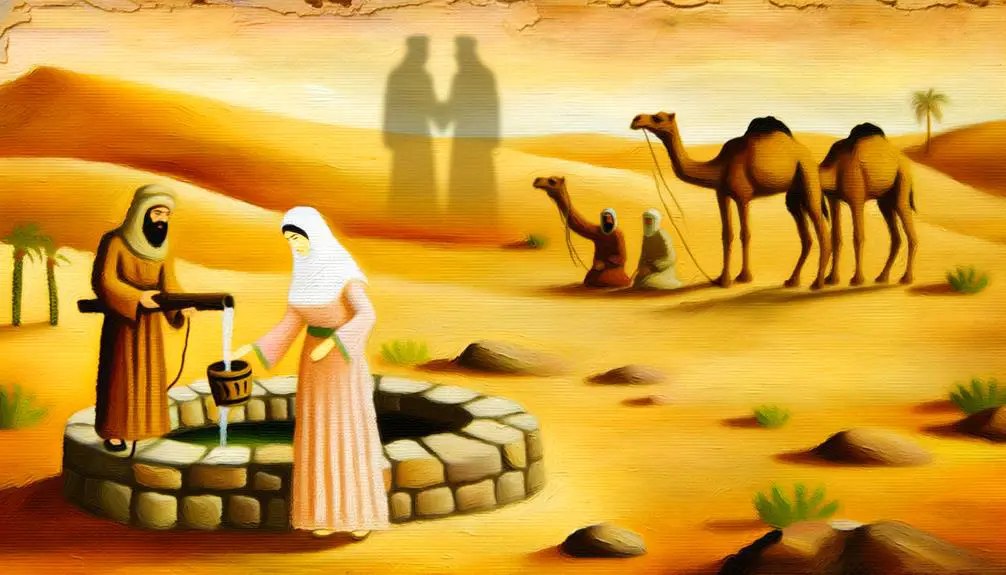
Following the narrative of Sarah, whose journey underscores faith's triumph over despair, we now turn our attention to Rebekah, whose story intertwines love with deception, offering a complex portrait of another pivotal matriarch in biblical lore. Rebekah's tale is deeply embedded in the fabric of family dynamics and sibling rivalry, presenting a multifaceted view of maternal influence and the ethical quandaries it can entail.
- Love at First Sight: Rebekah's introduction is marked by a divinely orchestrated meeting, setting the stage for a romance that would significantly impact the course of biblical history.
- Complex Family Dynamics: Her life is a testament to the intricate web of relationships within a family, highlighting both her role as a supportive wife and a mother caught in the throes of favoritism and manipulation.
- Sibling Rivalry: Perhaps the most striking aspect of Rebekah's story is her involvement in the intense rivalry between her sons, Esau and Jacob, showcasing the lengths to which she'd go to ensure the fulfillment of prophecy, favoring Jacob.
- Deception as a Means to an End: The pivotal moment of her narrative involves a deceptive scheme to secure Isaac's blessing for Jacob, raising questions about morality, divine will, and the consequences of such actions on family unity.
Rebekah's story, rich in themes of love, deception, and familial loyalty, offers a critical lens through which to examine the complexities of human relationships and the moral dilemmas they often precipitate. Her legacy, entwined with the destinies of her offspring, underscores the profound influence mothers wield within the biblical narrative and the broader discourse on moral and ethical conduct.
Jochebed: Defying a Pharaoh

You'll find Jochebed's story remarkable for its demonstration of a protective mother's courage in the face of grave danger.
Her ingenious plan to save her baby by creating an ark of bulrushes not only defied Pharaoh's decree but also showcased her resourcefulness and faith.
This act of defiance sets a precedent in biblical narratives, emphasizing the strength and wisdom of maternal instincts.
Protective Mother's Courage
In a bold act of defiance against Pharaoh's decree, Jochebed courageously hides her newborn son, showcasing a mother's protective instinct in the face of grave danger. Her actions epitomize the essence of maternal instincts and courageous acts, underpinning the lengths to which a mother will go to safeguard her child.
- Maternal Instincts: Innate drive to protect her offspring at all costs.
- Courageous Acts: Defying a ruler's edict to ensure her child's survival.
- Historical Context: Operates within a perilous socio-political environment.
- Moral Courage: Demonstrates profound moral fortitude amidst life-threatening circumstances.
Jochebed's story underscores the power of a mother's love intertwined with unwavering courage, illuminating the relentless spirit of motherhood.
Ingenious Baby's Ark Plan
Jochebed's creation of a makeshift ark for her son not only symbolizes her defiance against Pharaoh's decree but also showcases her ingenuity and deep maternal devotion. The architectural symbolism in this narrative is profound.
The ark, crafted from bulrushes and coated with tar and pitch, isn't merely a vessel for survival but a metaphor for protection, deliverance, and hope. Jochebed's actions are driven by a maternal instinct that transcends fear, illustrating the lengths a mother will go to protect her child. Her plan, meticulously executed, defies the edict of a tyrant, highlighting her courage and the strength of maternal love.
This episode underscores the power of maternal instinct fused with ingenuity, offering a compelling example of faith and resilience in the face of adversity.
Hannah: Prayers and Promises

Hannah's enduring faith manifests through her fervent prayers and solemn promises, marking a pivotal moment in biblical narratives about motherhood. Her story is a compelling testament to the power of prayerful dedication and the depth of a maternal vow. Hannah's journey from despair to fulfillment offers profound insights into the dynamics of faith, sacrifice, and divine intervention.
- Prayerful Dedication: Hannah's persistent prayers in the temple, pouring out her heart to God in her desire for a child, epitomize her unwavering faith and dedication.
- Maternal Vow: She makes a solemn promise to God, vowing that if He grants her a son, she'll dedicate him to the Lord's service.
- Divine Intervention: Her prayers are answered, leading to the birth of Samuel, who becomes one of the most influential figures in biblical history.
- Sacrifice and Fulfillment: Hannah fulfills her vow by bringing Samuel to the temple, a poignant act of faith and sacrifice that underscores her deep commitment to God.
Hannah's story is emblematic of the themes of sacrifice, promise, and divine response that permeate biblical narratives. Her experience illuminates the complexities of motherhood within a framework of devout faith, showcasing the transformative power of prayer and the significance of keeping one's promises to God. Hannah's narrative serves as an enduring symbol of hope and faithfulness, providing a rich source of inspiration for believers navigating their own journeys of faith and dedication.
Elizabeth: Late Blessings
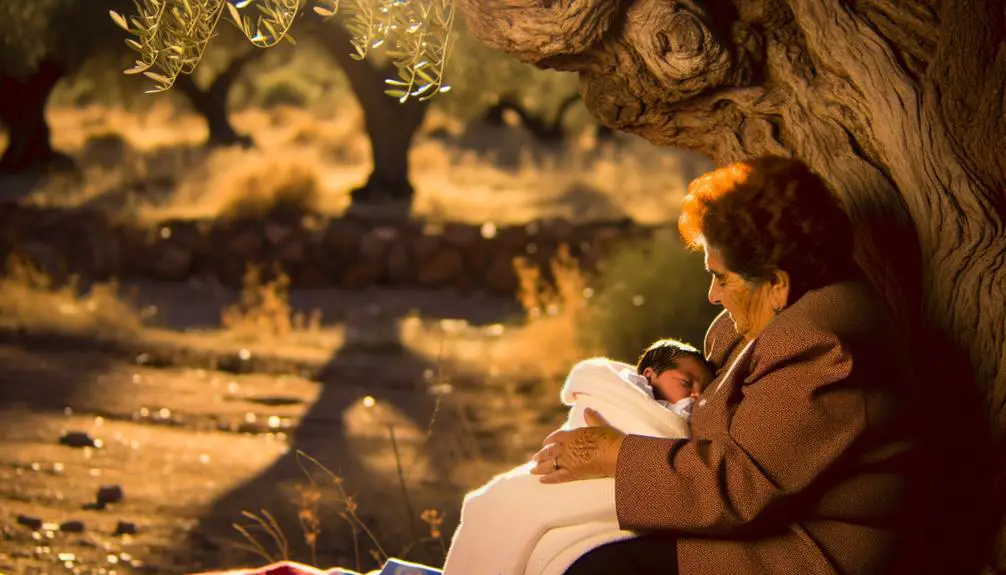
You encounter Elizabeth's story as a testament to the miracle of late motherhood and the power of faith amidst barrenness. Her narrative underscores the unexpected blessings that can arise when hope seems diminished.
Analyzing her journey offers insights into the divine intervention and perseverance witnessed in biblical accounts of motherhood.
Miracle of Late Motherhood
In the narrative of Elizabeth, the Bible presents a profound example of late motherhood as a miraculous event, showcasing divine intervention in the lives of the faithful. Elizabeth's story is emblematic of ageless faith and spiritual perseverance, transcending the natural limitations of age and societal expectations.
- Ageless Faith: Demonstrates unwavering belief in divine promises, regardless of one's age.
- Spiritual Perseverance: Highlights the importance of steadfastness in one's spiritual journey, even when faced with doubt.
- Divine Intervention: Showcases the role of divine power in transforming impossibilities into realities.
- Miraculous Birth: Offers hope and encouragement to those who believe in the possibility of miracles, reinforcing the notion that faith can lead to extraordinary outcomes.
Elizabeth's experience serves as a testament to the power of faith and persistence in the face of adversity.
Faith Amidst Barrenness
Amidst years of barrenness, Elizabeth's unwavering faith became a beacon of hope, illustrating the profound spiritual belief that late blessings, though delayed, are never denied by divine decree. Her narrative embodies the essence of divine intervention and spiritual perseverance, crucial elements in the theological discourse on faith amidst trials.
Elizabeth's story, deeply embedded in the Judeo-Christian ethos, serves as a testament to the belief in the omnipotence of divine will and the virtue of steadfast faith. Her experience underscores the notion that divine timing operates beyond human understanding, offering a unique lens through which to analyze the interplay between human despair, spiritual resilience, and the eventual realization of long-awaited blessings.
Through Elizabeth's journey, one observes the transformative power of unwavering belief in the face of seemingly insurmountable odds.
Mary: Divine Motherhood
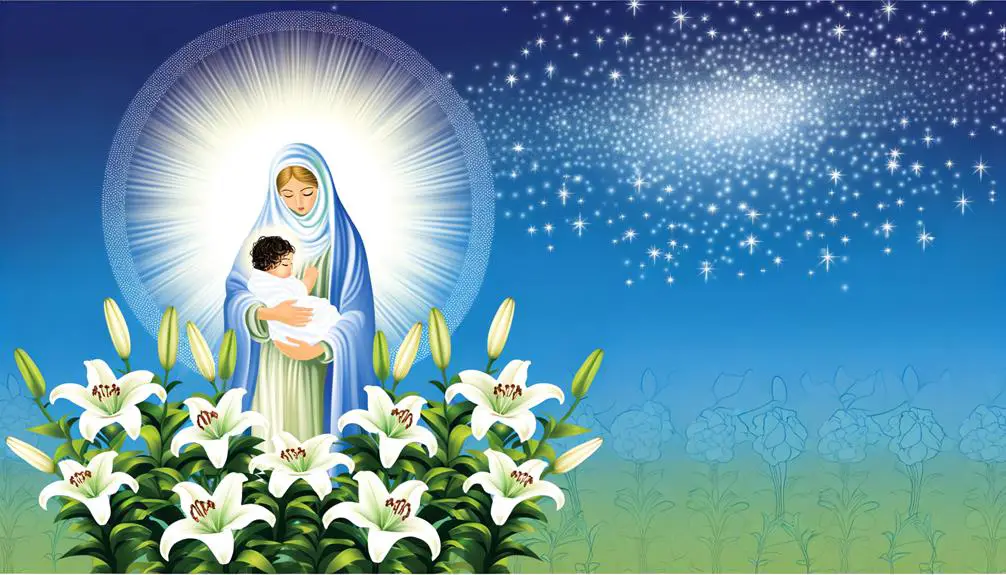
Mary's divine motherhood, a central tenet of Christian theology, profoundly illustrates her unique role in the incarnation of Jesus Christ. This exceptional event, marked by the Virgin birth and Angelic annunciation, showcases her pivotal participation in the divine plan for humanity's salvation. Unlike any other mother in the Bible, Mary's experience combines the miraculous with the profoundly human, enveloping her in a narrative that has captivated believers for centuries.
In analyzing Mary's divine motherhood, several key aspects emerge:
- Virgin birth: This element not only emphasizes the miraculous nature of Jesus's birth but also underscores Mary's purity and obedience to God's will. It's a cornerstone of Christian doctrine that sets her apart from all other biblical mothers.
- Angelic annunciation: The moment when the Angel Gabriel announces to Mary that she'll conceive a child by the Holy Spirit is pivotal. It signifies divine selection and trust, highlighting her unmatched role in salvation history.
- Fulfillment of prophecy: Mary's motherhood fulfills ancient prophecies about the Messiah's birth. This connection between Old Testament prophecies and the New Testament realization through Mary underscores the continuity and depth of God's salvation plan.
- Model of faith and obedience: Mary's acceptance of her role, despite the personal and societal challenges it presents, offers a profound example of faith and obedience to God's will.
Mary's divine motherhood transcends mere biological functions, integrating her into the very heart of Christian salvation history. Her unique position, marked by divine intervention and personal commitment, establishes her as an enduring symbol of faith and grace in Christian theology.
Frequently Asked Questions
How Did the Cultural and Societal Norms of Their Times Impact the Parenting Styles of Biblical Mothers?
You're exploring how cultural and societal norms influenced parenting styles, focusing on parenting challenges and societal expectations.
These norms significantly shaped how mothers approached parenting, setting expectations and limitations on their roles.
Societal expectations dictated acceptable behaviors, influencing mothers' decisions and strategies in raising their children.
These challenges were navigated within the context of their times, reflecting the complex interplay between cultural norms and individual parenting styles.
Are There Any Recorded Instances or Traditions About the Relationships These Biblical Mothers Had With Their Daughters or Female Relatives, Outside of Their Roles With Their Famous Sons?
Yes, there are instances highlighting female mentorship and sisterly bonds. Consider Naomi and Ruth; their relationship transcends traditional mother-daughter roles, embodying deep mentorship and mutual support.
Naomi's guidance in navigating societal norms and personal decisions showcases the profound impact of female mentorship. This narrative not only enriches our understanding of their bond but also illustrates the significance of such relationships in fostering resilience and wisdom among women in their communities.
In What Ways Do Modern Interpretations or Teachings About These Biblical Mothers Differ From Their Historical or Textual Representations?
You're exploring how modern interpretations of historical figures contrast with their textual accuracy.
It's necessary to note that contemporary views often emphasize qualities or narratives that align with current values, sometimes stretching beyond the original depictions.
This analytical approach reveals how societal shifts influence our understanding of historical figures.
In doing so, it's crucial to maintain an objective stance, scrutinizing both modern teachings and their foundational texts to discern these differences.
How Do the Stories of These Mothers From the Bible Influence Contemporary Discussions on Motherhood, Especially in Religious Communities?
You're diving into how tales of yesteryears shape today's motherhood chats, especially in those church halls.
It's not just about swapping recipes anymore; it's about understanding the hefty blend of motherhood values and feminine leadership these stories serve up.
They're not just bedtime stories; they're blueprints.
Analyzing these narratives, you'll find they significantly influence contemporary discussions on motherhood, echoing through sermons and bible study groups, molding modern perceptions of maternal roles.
Can We Find Any Examples of Co-Parenting or Shared Mothering Responsibilities Among Women in the Bible, Particularly in the Stories of These Mothers?
You're exploring whether the Bible features examples of shared custody or maternal cooperation among women. While the text doesn't explicitly highlight modern co-parenting concepts, instances like Moses' mother and the Pharaoh's daughter collaborating to raise him suggest early forms of shared mothering responsibilities.
This analysis indicates that, even in ancient narratives, there's an acknowledgment of collective maternal roles, offering a foundational perspective on the dynamics of maternal cooperation in historical contexts.
Conclusion
In the tapestry of biblical narratives, these mothers weave threads of resilience, faith, and love. Like stars guiding through darkness, Sarah, Rebekah, Jochebed, Hannah, Elizabeth, and Mary illuminate paths of devotion and sacrifice.
Their stories, far from mere historical accounts, serve as allegories for the trials and triumphs of motherhood. Analyzing their journeys reveals a universal truth: the strength of a mother's love, a force that defies time, shaping nations and destinies with its indomitable spirit.

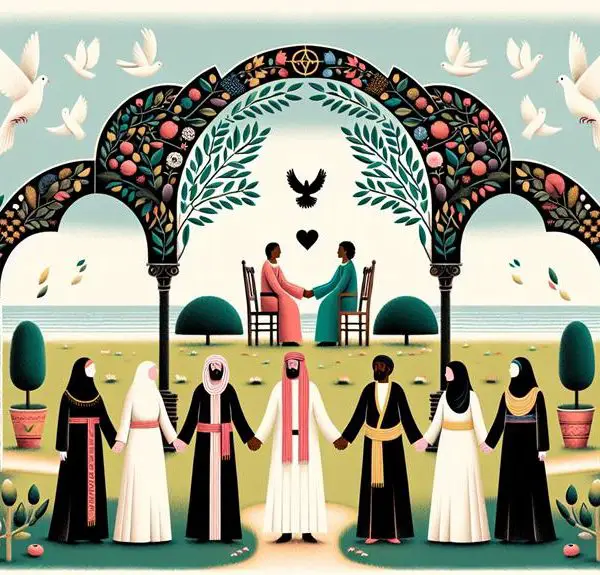
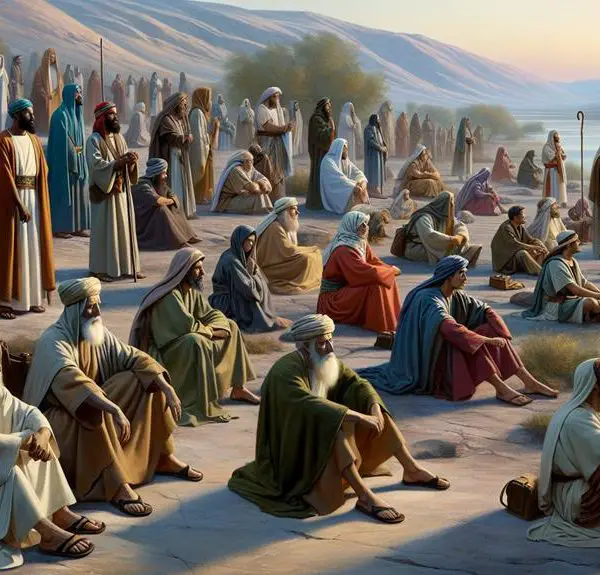
Sign up